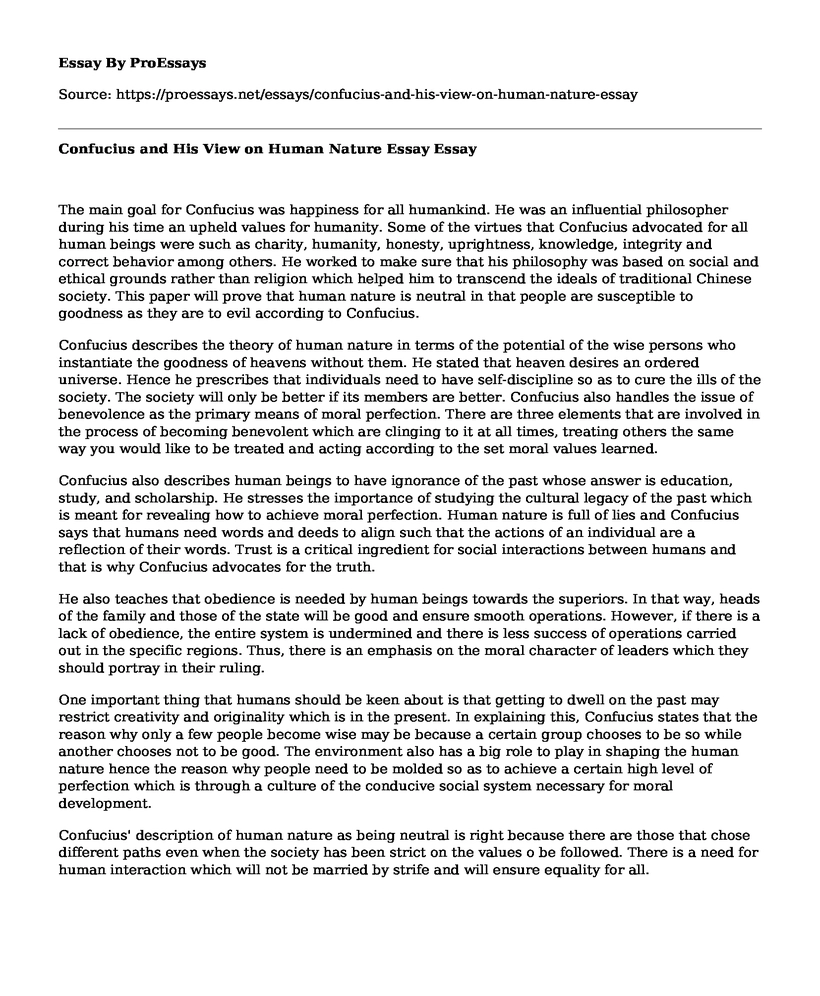The main goal for Confucius was happiness for all humankind. He was an influential philosopher during his time an upheld values for humanity. Some of the virtues that Confucius advocated for all human beings were such as charity, humanity, honesty, uprightness, knowledge, integrity and correct behavior among others. He worked to make sure that his philosophy was based on social and ethical grounds rather than religion which helped him to transcend the ideals of traditional Chinese society. This paper will prove that human nature is neutral in that people are susceptible to goodness as they are to evil according to Confucius.
Confucius describes the theory of human nature in terms of the potential of the wise persons who instantiate the goodness of heavens without them. He stated that heaven desires an ordered universe. Hence he prescribes that individuals need to have self-discipline so as to cure the ills of the society. The society will only be better if its members are better. Confucius also handles the issue of benevolence as the primary means of moral perfection. There are three elements that are involved in the process of becoming benevolent which are clinging to it at all times, treating others the same way you would like to be treated and acting according to the set moral values learned.
Confucius also describes human beings to have ignorance of the past whose answer is education, study, and scholarship. He stresses the importance of studying the cultural legacy of the past which is meant for revealing how to achieve moral perfection. Human nature is full of lies and Confucius says that humans need words and deeds to align such that the actions of an individual are a reflection of their words. Trust is a critical ingredient for social interactions between humans and that is why Confucius advocates for the truth.
He also teaches that obedience is needed by human beings towards the superiors. In that way, heads of the family and those of the state will be good and ensure smooth operations. However, if there is a lack of obedience, the entire system is undermined and there is less success of operations carried out in the specific regions. Thus, there is an emphasis on the moral character of leaders which they should portray in their ruling.
One important thing that humans should be keen about is that getting to dwell on the past may restrict creativity and originality which is in the present. In explaining this, Confucius states that the reason why only a few people become wise may be because a certain group chooses to be so while another chooses not to be good. The environment also has a big role to play in shaping the human nature hence the reason why people need to be molded so as to achieve a certain high level of perfection which is through a culture of the conducive social system necessary for moral development.
Confucius' description of human nature as being neutral is right because there are those that chose different paths even when the society has been strict on the values o be followed. There is a need for human interaction which will not be married by strife and will ensure equality for all.
Bibliography
Confucius: SCT, 25-33. The warring states and the 100 schools. Primary Readings
De Vagu, Wiliam Theodore, Wing-tsit Chan, and Burton Watson. "Sources of Chinese Tradition. 2 vols."
Cite this page
Confucius and His View on Human Nature Essay. (2022, Mar 02). Retrieved from https://proessays.net/essays/confucius-and-his-view-on-human-nature-essay
If you are the original author of this essay and no longer wish to have it published on the ProEssays website, please click below to request its removal:
- Happiness According to Aristotle
- Philosophy Essay Example: Nietzsche
- The Deepest Human Life and Kant's Ethics Essay
- Ethical Issues: Non-Monogamy Relationship Essay Example
- Ethics and Critical Thinking: The Stanford Prison Experiment
- Essay Example on Harlem by Langston Hughes: Delayed Dreams and the American Dream
- Free Essay Example on Childhood vs. Adulthood: Cognitive & Social Development







